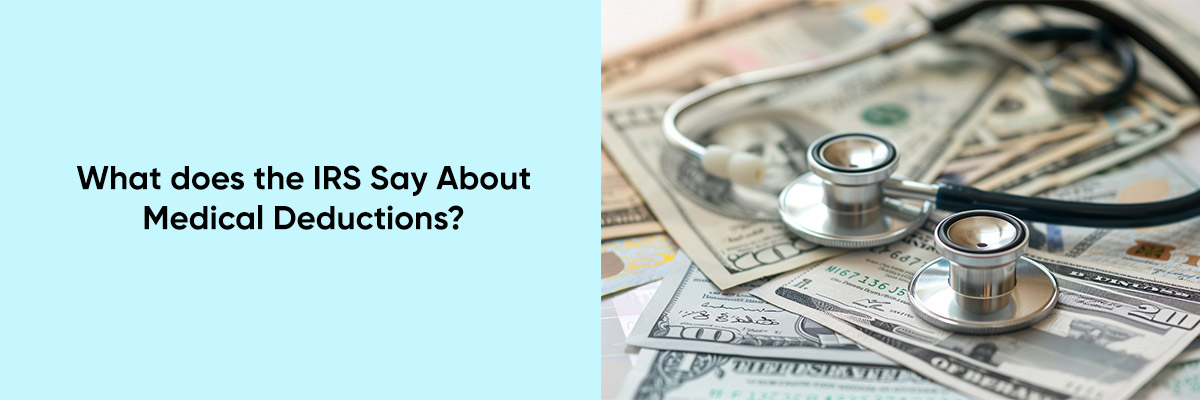The Internal Revenue Service (IRS) provides taxpayers with the opportunity to deduct certain medical expenses from their taxable income, potentially reducing the amount they owe. Understanding what qualifies as a deductible medical expense and how to claim these deductions is crucial for taxpayers looking to minimize their tax liability.
Here’s a detailed look at what the IRS says about medical deductions.



1. Definition of Medical Expenses
According to the IRS, medical expenses are the costs associated with the diagnosis, cure, mitigation, treatment, or prevention of disease. These also include expenses for treatments affecting any structure or function of the body. The IRS allows deductions for a wide range of medical and dental expenses for you, your spouse, and your dependents.
2. Qualifying Medical Expenses
Some common qualifying medical expenses include:
- Doctor and Hospital Visits: Fees paid to doctors, surgeons, specialists, and other medical practitioners, as well as hospital services, are deductible.
- Prescription Medications: Only prescribed drugs or insulin are eligible for deductions. Over-the-counter medications are generally not deductible unless prescribed by a doctor.
- Medical Equipment and Supplies: The cost of medical equipment, supplies, and diagnostic devices can be deducted. This includes items like crutches, eyeglasses, hearing aids, and artificial limbs.
- Preventive Care: Costs for preventive services, such as vaccinations and routine check-ups, are deductible.
- Therapy and Treatment: Expenses for physical therapy, psychiatric care, and other therapies are deductible if they are for medical care.
- Insurance Premiums: Premiums paid for health insurance, including Medicare, can be deducted if they are not covered by an employer or a government program.
3. Limitations and Requirements
To claim medical deductions, certain conditions must be met:
- Threshold Requirement: Medical expenses are only deductible to the extent that they exceed 7.5% of your adjusted gross income (AGI) for the tax year. This means you can only deduct the amount of your medical expenses that is above this threshold.
- Itemized Deductions: Medical expenses must be itemized on Schedule A of your tax return. You cannot claim medical expenses if you choose to take the standard deduction.
- Qualified Dependents: You can include medical expenses paid for yourself, your spouse, and your dependents. A dependent generally includes anyone you claim on your tax return.
4. Non-Deductible Expenses
The IRS also specifies certain medical expenses that are not deductible, such as:
- Cosmetic Surgery: Unless necessary to improve a deformity arising from a congenital abnormality, an accident, or disease, cosmetic surgery is not deductible.
- General Health Expenses: Expenses such as vitamins, health club memberships, and non-prescription medicines (except insulin) are generally not deductible.
- Reimbursed Expenses: Any medical expenses reimbursed by insurance or another source cannot be deducted.
5. Special Cases and Considerations
There are a few special considerations when it comes to medical deductions:
- Long-Term Care: The cost of long-term care services and insurance premiums for long-term care are deductible within certain limits.
- Travel for Medical Care: Travel expenses primarily for and essential to medical care may be deductible, including mileage, lodging, and transportation costs.
6. How to Claim Medical Deductions
To claim medical deductions, you must:
- Keep Detailed Records: Maintain thorough documentation of all medical expenses, including receipts, invoices, and insurance statements.
- Use Schedule A: Itemize your deductions on Schedule A of Form 1040. Only medical expenses exceeding 7.5% of your AGI are deductible.
- Include All Eligible Expenses: Ensure that you include all eligible medical expenses to maximize your deduction.
Conclusion
Medical deductions can provide significant tax savings for those with high medical expenses. However, it is essential to understand the IRS’s rules and guidelines to ensure that you claim only eligible expenses and meet all necessary requirements. Keeping detailed records and consulting with a tax professional can help you navigate the complexities of medical deductions and potentially reduce your overall tax liability.


